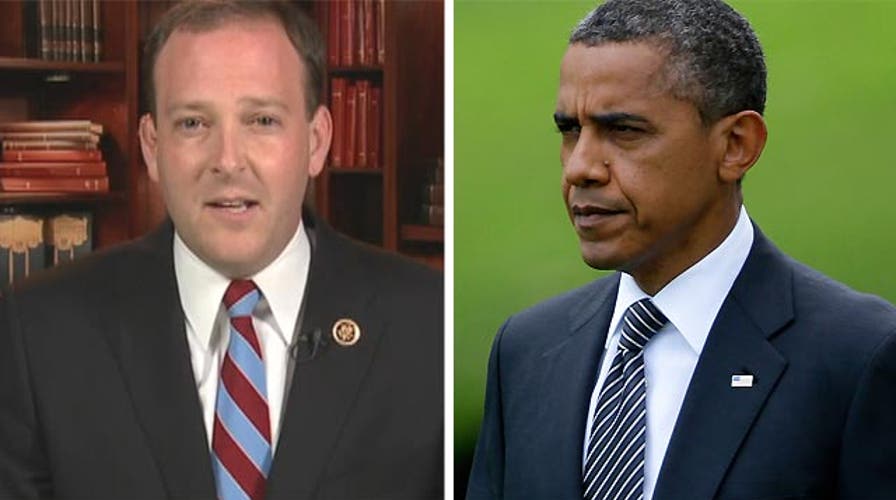Rep. Zeldin on president's handling of nuke talks with Iran
Lawmaker says Obama's 'getting played'
This is a rush transcript from "Your World," April 7, 2015. This copy may not be in its final form and may be updated.
CHARLES PAYNE, GUEST HOST: Now to New York Republican Congressman Lee Zeldin, who has been warning about this bill. He's a member of the Foreign Affairs Committee.
Congressman, a lot of things that you had told us about, that you have been warning people about seems to have -- maybe have come to fruition. The bottom line is, we still don't know all the details. But where do you think we go from here?
REP. LEE ZELDIN, R-N.Y.: Well, it's clear that this president is -- it's like a fire sale of the free world's greatness and security.
This is more proof that this is a bad deal. We just saw a clip where the White House spokesperson is saying that they're just starting their sales pitch. And the fact is that last -- just a few days ago, when they were releasing their -- quote -- "fact sheet" on their framework agreement, it was within 24 hours that the Iranian foreign minister went to his Twitter feed and called it just spin.
So, like charity, this president is cashing in the goodwill that's been earned on the backs of diplomats and service members for decades and generations. It is -- when the president says that there will be no Iran nuclear weapon on my watch, those words "on my watch," what's most concerning is that there is life after President Obama.
And the next presidents and the president after that is going to be inheriting a tougher situation to block an Iran nuclear program because of the decisions made by this president and who knows what else he's willing to concede in the next few months while he scrambles to finalize a deal.
PAYNE: It's so hard to believe that we're back in a place where we're being told, you know, pass the bill and worry about what's in it later. I think Americans learned a lesson on that sales pitch before.
And to your point, there are stark differences between what Iran says that is on their fact sheet and what's on our fact sheet. On sanctions, there's an immediate -- there's big-time differences on the centrifuges. There's a different timeline and also difference on research and development, on the uranium stockpiles. It goes on and on and on.
How can there be this much difference between these two supposedly agreement terms, and how can the American public be expected to OK something like that?
ZELDIN: Well, the president is getting played. We should not trust the Iranians. They are not negotiating in good faith. They're threatening to wipe Israel off the map. They are the world's largest state sponsor of terrorism.
They're working to overthrow foreign governments. There's nothing with these negotiations as far as Iran's development of ICBMs. They are maintaining their nuclear facilities, keeping their centrifuges, continuing to enrich uranium. It's a bad deal. And there are a lot of people who are talking about this bad deal who are willing to accept a good deal if there was one to be had.
But this president trusts the Iranians. Why is it that the Iranians are dancing in the streets while here at home we have so much concern?
PAYNE: Right.
Is there -- the president on the afternoon that this was announced, he -- and I guess you could call it maybe his own victory lap, he intimated that there were three alternatives to this, war and other things. And he threw it out that anyone who is objecting to this, what would be the counter?
In other words, what would you counter to him and to the American public that would be better than this supposed bill?
ZELDIN: Well, first off, this is the worst-case scenario. We have not been engaged in war with Iran up to this point.
Now the president's making it seem like we have to agree to any deal. We need to cut a deal just to cut a deal with Iran because the only alternative is war. Meanwhile, we haven't been engaged in a military conflict with them leading up to this very point.
So it's unfortunate. It's disingenuous. Again, the president is trying to sell a bad deal to the American public who now have done their homework.
PAYNE: Right.
ZELDIN: The American public, there are average people who are watching this at home who understand what to look for inside of that fact sheet.
So the fact sheet itself contains too many concessions. Now he goes public with it. Who knows what else he's willing to concede? And with the Iranians rejecting that fact sheet, he's just weakened his bargaining position. And Congress isn't having it.
PAYNE: Right.
ZELDIN: And Democrats -- kudos to those congressional Democrats stepping up willing to take on a president of their own party, who are willing to call a spade a spade.
PAYNE: There's no doubt. There's no doubt. When you hear a name like Chuck Schumer backing Corker and the ability of Congress to have a say in this, it makes a lot of people breathe a sigh of relief. And hopefully the American people will have a say in this as well.
We appreciate your time this afternoon. Thank you.
ZELDIN: Thank you, Charles.
Content and Programming Copyright 2015 Fox News Network, LLC. ALL RIGHTS RESERVED. Copyright 2015 CQ-Roll Call, Inc. All materials herein are protected by United States copyright law and may not be reproduced, distributed, transmitted, displayed, published or broadcast without the prior written permission of CQ-Roll Call. You may not alter or remove any trademark, copyright or other notice from copies of the content.

